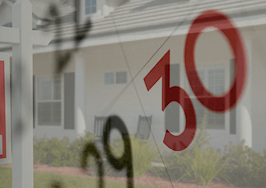- Homes often have tell tale signs of unexpected inhabitants; buyers might not mind, but you should check what your state laws are regarding selling stigmatized property.
A few years ago, my friends and I went on an after-dark tour of the Eastern State Penitentiary in Philadelphia during its Halloween scarefest, Terror Behind the Walls.
Having grown up watching horror movies, I don’t scare easily, and being a true believer in science and all things explainable, I believed haunting to be nothing but hokum. My experiences that night at the crumbling prison changed all that. It wasn’t the haunted house portion of the tour that scared the bejeepers out of me — it was the actual historic prison tour.
As the tour progressed, we went from the original tiny cells to a more “modern” wing of the historic prison, and the guide had us all gather into one particular cell.
As I stepped in, we all noticed the temperature had dropped drastically, and I suddenly felt short of breath and incredibly uncomfortable. As I reached for my asthma inhaler, the tour guide told us we were standing at the site of the bloodiest and most terrifying murder to have ever occurred in the prison.
As I puffed away, I noticed I wasn’t the only one having an odd physical reaction.
A few other visitors felt dizzy, nauseated and short of breath. When we left the area, we all felt better. The tour guide said it was not unusual for people to feel unwell during this part of the tour.
He left it up to us as to determine why the site of this horrific crime made so many visitors uncomfortable before even being told what happened in the room.
The Eastern State Penitentiary is currently one the most-studied buildings in the United States, with over 60 paranormal teams going every year to record paranormal findings. Zack Bagans, host of “Paranormal Challenge,” called the Eastern State Penitentiary “one of the most-haunted places in the world.”
Haunted houses are fun to visit in a terrifying way, but living in them — and for that matter, selling them — is an entirely different story.
According to a survey done by realtor.com last month, 33 percent of people would live in a haunted house, 25 percent said maybe, and 42 percent said absolutely not.
When asked what could potentially change their minds:
- 40 percent of respondents indicated that they need a price reduction to choose a haunted home over a non-haunted home
- 35 percent require a better neighborhood
- 32 percent need larger square footage
- 29 percent would do so if more bedrooms were involved
The controversial idea of ghostly existence gets a lot more serious when we start talking about cold hard cash. Nothing would make your head spin Exorcist-style like losing thousands of dollars on a home sale for something you can’t prove.
However, this topic has raised its zombie head enough times that most states have specific rules of disclosure that pertain to this issue.
The stigmatized property and state laws
Whether you believe in the paranormal or not, haunted homes are considered stigmatized properties in many states.
Properties where a murder, suicide, cult activity, famous adulteries or other crimes have taken place are often considered stigmatized.
But most states have slightly different wordings on the basic definition of “stigmatized.”
Virginia
For example, the state of Virginia does not require disclosure of any “act or occurrence which had no effect on the physical structure of the real property, its physical environment, or the improvements located thereon.”
California
California’s Civil Code states death on a property does not have to be disclosed if it occurred more than three years prior to the sale. But if the buyer asks about deaths on the property prior to this time, it must be disclosed.
New York
The state of New York has its own law concerning the ghostly tenant. In the 1991 case of Stambovsky v. Ackley, the New York State Supreme Court ruled that this house was legitimately haunted, and the seller did have a duty to disclose this fact.
What influenced the court’s decision was the seller had published stories in Readers Digest and local publications pertaining to the home’s haunted status.
The court ruled if the seller was making this public knowledge, the seller had the obligation to disclose this information to potential buyers, as well.
What was also interesting in the realtor.com survey is that it’s not just if a property is haunted, but how the haunting manifests that is important to a buyer.
Nearly half of those surveyed said strange noises or hot or cold spots in a home were fine, but if the kitchen table starts to levitate, only 20 percent would find that acceptable.
I want to know of that 20 percent, how they would feel if the creepy twins from The Shining showed up to “play” one night.
At that point, I think it’s time to run.
How to spot a haunted home
It’s not just murder that entices ghosts to stick to a property like gum to the bottom of your shoe. Betrayal, unrequited love, revenge and punishment are often motives. But not all ghosts have malevolent purposes.
According to research conducted by Theresa Mills, some ghosts are here to protect those they left behind, especially in cases of drug overdoses and suicides.
Some want to warn the living of impending problems or are seeking someone to give them a proper burial. Other ghosts don’t even know they are dead (what in the Sixth Sense?), but believe they still exist in a home, and the current living residents are haunting them (no, The Others).
Buyers have a tendency to look for haunted house red flags, according to an article published by the National Association of Realtors.
If a home has a cemetery on the property, the house is over 100 years old or near a battlefield, you are more likely to field paranormal inquiries than on a newly built home in an established city.
Buyers are also leery of homes that have had a quick turnover of owners or also are surprisingly “well-priced.”
A while ago, I had the privilege of hosting open houses for a home that was used as a hospital during the Civil War. A gorgeous and stately home, we often did open houses in pairs for safety reasons as the home was vacant and quite large.
Every single one of us has a story or two about the house and something we heard or saw, but nothing really substantive, and certainly nothing malicious. One day, with the owner’s permission, I had to go by myself, so I brought my dog, Riley.
As I opened shutters and turned on lights, he followed me through, until we got to the finished loft. He stood at the bottom of the steps and growled, all the hair standing up on his back.
Riley started barking, and simply refused to come up the stairs with me. Suddenly, he yelped and jumped back, almost as if he had been kicked. Without a second glance at me, he took off running down two flights of stairs and camped out at the back door, begging to go outside.
Apparently, I was on my own.
Most historic homes have had deaths in them through their long histories. Prior to antibiotics and sterile operating rooms, many kitchens were sites of more than just routine medical care, and bedrooms often doubled as a maternity ward.
If a buyer needs an absolute assurance that no one died on a property, stay away from the historic home, as home deaths were not unusual. If a buyer is really worried about this, you can always refer them to DiedInHouse.com to do their own research.
When you hear hoofbeats, it’s usually not zebras
Most paranormal activity can be attributed to actual causes. Flickering lights can be from a loose light bulb, and a door that slams shut on its own may be in a particularly drafty room.
Weird lights and shadows are not uncommon in homes with leaded glass windows that can distort light. A thorough home inspection can usually uncover causes of most minor oddities.
If during the inspection the walls start to bleed, well, that’s a whole other problem.
When people came to the civil war hospital-house, I offered them the history I knew. I didn’t shy away from the fact that the home had been a hospital — that is a matter of public record.
Some visitors had concerns of hauntings, others didn’t care one way or another, and a few wanted the house even more because it just had to be haunted, in their opinion.
Potential buyers are going to walk into a house already knowing how they feel about the supernatural and if they are willing to live among it. All you can do is be polite, offer facts and work with the people who are interested in the home.
After leaving the Eastern State Penitentiary, we were all more than a little spooked by what we had seen.
As we sat down to dinner, we started coming up with more likely reasons for the reactions we experienced. My asthma flare must have been from the building being old and moldy.
As much of the prison was falling down, the cold room could have been an odd draft from a gust of wind blowing through the deteriorating walls. After all, wouldn’t being in an abandoned prison with an infamous past, in the dark, certainly make everything appear more sinister than it would have during the day?
Absolutely!
So, turns out, our paranormal experiences at the prison were in reality the effects of great storytelling and the powers of persuasion and imagination.
Or were they?
Editor’s note/correction: A previous version of this article cited a definition of a stigmatized property from LegalMatch that included “AIDS.” However, it is illegal to disclose whether a current or former owner of a house had AIDS or was HIV positive under federal fair housing laws.
Maria Dampman is the owner and manager of Smiling Cat Farm and a Virginia State licensed Realtor and ABR with Century 21 Redwood in Leesburg, Virginia. Visit her on Facebook or LinkedIn.






